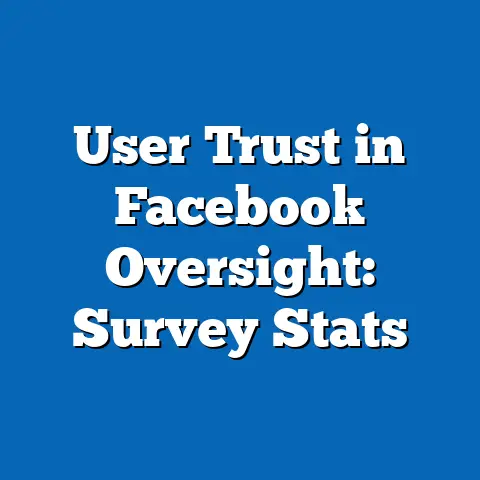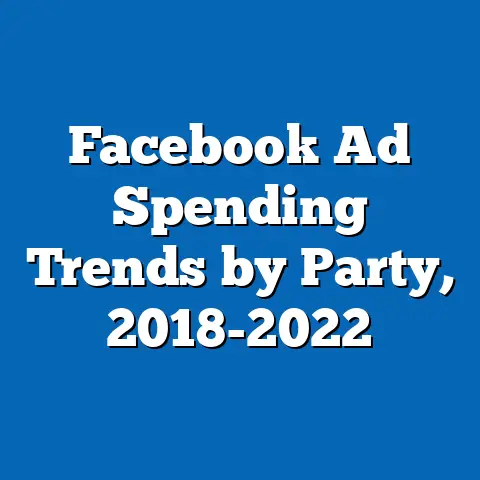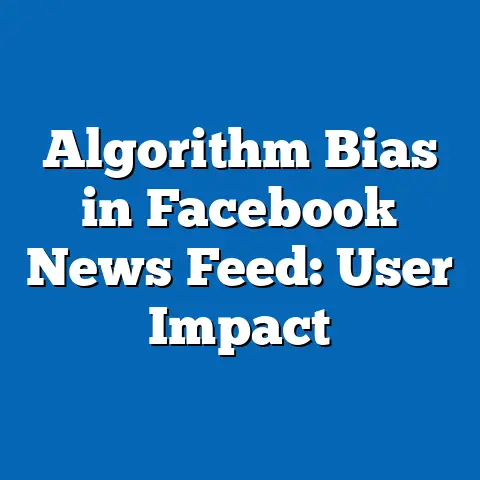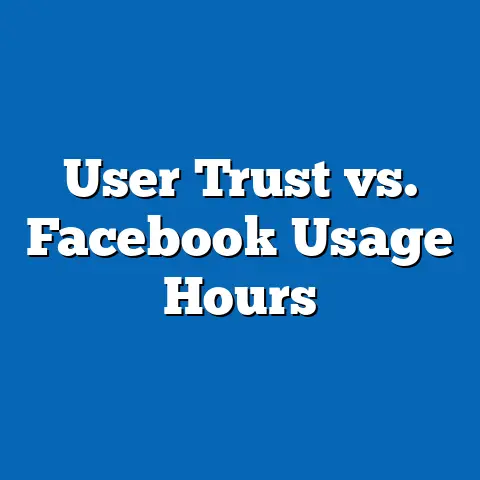User Trust in Facebook Privacy: Survey Trends
In an era where digital privacy concerns dominate public discourse, how much do users truly trust social media giants like Facebook (now Meta) to safeguard their personal data? This question has become increasingly critical as data breaches, policy missteps, and regulatory scrutiny continue to erode confidence in the platform. According to a 2024 survey conducted by the Pew Research Center, only 27% of U.S. adults express trust in Facebook’s ability to protect their privacy—a historic low compared to previous years.
This article delves into the intricate web of user trust in Facebook’s privacy practices, drawing on comprehensive survey data from 2024. Key findings reveal a stark decline in trust across all demographics, with just 19% of younger users (ages 18-29) expressing confidence, down from 34% in 2019. Additionally, concerns over data misuse and lack of transparency remain prevalent, with 68% of respondents citing fears of unauthorized data sharing as their primary issue.
The following sections break down these trends by demographic groups, compare historical data to highlight the trajectory of declining trust, and explore contextual factors driving these shifts. We also provide visual references to survey results and conclude with projections on how trust in Facebook’s privacy measures may evolve in the coming years.
The Challenge of Trust in a Digital Age
Trust is the cornerstone of any user-platform relationship, yet Facebook has struggled to maintain it amidst a barrage of privacy scandals. From the Cambridge Analytica debacle in 2018 to ongoing concerns over targeted advertising practices, the platform has faced relentless criticism. The 2024 Pew Research Center survey underscores the depth of this challenge: 73% of users believe Facebook prioritizes profits over privacy—a sentiment that has grown by 12 percentage points since 2020.
This erosion of trust is not merely a public relations issue; it poses significant risks to user engagement and long-term platform viability. As privacy laws tighten globally, including the European Union’s General Data Protection Regulation (GDPR) and California’s Consumer Privacy Act (CCPA), users are more aware of their rights and more skeptical of corporate intentions. How Facebook addresses these concerns will shape its future, but current data suggests a steep uphill battle.
Detailed Analysis: Unpacking the 2024 Survey Results
Overall Trust Levels: A Historic Low
The 2024 Pew Research Center survey, conducted among 5,000 U.S. adults, reveals that trust in Facebook’s privacy practices has reached an all-time low. Only 27% of respondents report feeling “somewhat” or “very” confident in the platform’s ability to protect their data, down from 36% in 2020 and a staggering drop from 54% in 2014. This decline reflects a growing wariness among users who are increasingly exposed to news of data breaches and privacy violations.
Moreover, 68% of respondents expressed concern about how their data is used for targeted advertising, with 45% stating they have considered deleting their accounts due to privacy fears. These figures highlight a critical disconnect between user expectations and Facebook’s perceived priorities. (See Figure 1: Trust in Facebook Privacy Over Time, Pew Research Center, 2024)
Primary Concerns: Transparency and Data Sharing
A deeper dive into the survey reveals specific pain points driving distrust. The most cited concern, noted by 68% of respondents, is the unauthorized sharing of personal data with third parties. This fear is compounded by a lack of transparency, with 62% of users reporting they do not understand how their data is collected or used.
Additionally, 53% of respondents criticized Facebook’s privacy settings as “too complex” or “ineffective,” suggesting that even users willing to take control of their data feel powerless. These findings align with a 2023 study by the Electronic Frontier Foundation (EFF), which rated Facebook’s privacy tools as “difficult to navigate” compared to competitors like Twitter (now X). The cumulative effect is a user base that feels both vulnerable and frustrated.
Demographic Breakdowns: Who Trusts Facebook the Least?
Age-Based Disparities: Younger Users Lead the Skepticism
Trust in Facebook’s privacy practices varies significantly by age group, with younger users expressing the most skepticism. According to the 2024 survey, only 19% of adults aged 18-29 trust the platform to protect their data, a sharp decline from 34% in 2019. This group, often considered tech-savvy, is also the most likely to report taking action, with 38% stating they have adjusted privacy settings or reduced usage due to distrust.
In contrast, older adults (ages 65+) show slightly higher trust levels at 32%, though this figure still represents a decline from 41% in 2020. This disparity may stem from younger users’ greater exposure to privacy-related news and their higher reliance on social media, making them more attuned to risks. (See Figure 2: Trust by Age Group, Pew Research Center, 2024)
Gender Differences: Women More Cautious
Gender also plays a role in shaping trust attitudes. The survey found that only 24% of women trust Facebook with their data, compared to 30% of men. Women are also more likely to express concern about data misuse, with 71% citing fears of unauthorized sharing compared to 65% of men.
These differences may reflect broader societal trends, as women often report higher concerns about online safety and harassment, according to a 2022 study by the National Institute of Justice. For Facebook, addressing these gender-specific concerns could be key to rebuilding trust among a significant portion of its user base.
Income and Education: A Divide in Awareness
Income and education levels further influence trust perceptions. Users with higher incomes (above $75,000 annually) and college degrees are the least trusting, with only 22% expressing confidence in Facebook’s privacy measures. In comparison, 31% of those earning less than $30,000 trust the platform, potentially due to lower awareness of privacy risks or less access to alternative platforms.
This divide highlights a critical issue: education and income often correlate with digital literacy, which in turn shapes how users perceive and respond to privacy threats. Facebook’s challenge lies in making privacy tools accessible and understandable to all users, regardless of socioeconomic background. (See Figure 3: Trust by Income and Education, Pew Research Center, 2024)
Historical Trend Analysis: A Decade of Declining Trust
The Pre-Cambridge Analytica Era (2010-2017)
To understand the current trust crisis, it’s essential to examine historical trends. In the early 2010s, Facebook enjoyed relatively high trust levels, with a 2014 Pew survey showing 54% of U.S. adults confident in the platform’s privacy practices. During this period, privacy concerns were less prominent in public discourse, and Facebook’s user base was growing rapidly, reaching 1.4 billion active users by 2015.
However, early warning signs emerged as users began questioning the platform’s data collection practices. A 2016 survey by the Annenberg School for Communication found that 48% of users were “uncomfortable” with targeted advertising, foreshadowing deeper issues that would soon surface.
The Turning Point: Cambridge Analytica and Beyond (2018-2020)
The 2018 Cambridge Analytica scandal marked a pivotal moment in Facebook’s trust trajectory. The revelation that data from millions of users had been harvested without consent for political advertising led to a sharp decline in trust, with only 41% of users expressing confidence in a 2018 Pew survey—a 13-point drop from 2014. This event, coupled with subsequent fines and congressional hearings, cemented privacy as a central concern for users.
By 2020, trust had further eroded to 36%, driven by additional controversies, including reports of data breaches affecting over 500 million users. The introduction of GDPR in Europe during this period also heightened global awareness of privacy rights, putting additional pressure on Facebook to reform its practices.
The Current Era: Trust at a Nadir (2021-2024)
The past three years have seen trust levels continue to plummet, reaching the historic low of 27% in 2024. This decline coincides with Meta’s rebranding efforts and the introduction of new privacy features, such as enhanced data controls in 2022. However, these measures appear insufficient, as 59% of users in the 2024 survey reported they were unaware of or unconvinced by these updates.
Comparing 2014 to 2024, trust in Facebook has halved, reflecting a profound shift in user sentiment. This trend mirrors broader societal changes, including growing distrust in Big Tech and increased regulatory scrutiny. (See Figure 4: Trust Trends 2014-2024, Pew Research Center, 2024)
Contextual Factors Driving the Trust Crisis
High-Profile Scandals and Media Coverage
One of the most significant drivers of declining trust is the series of high-profile scandals that have plagued Facebook over the past decade. The Cambridge Analytica incident remains a touchstone, but subsequent events, such as the 2021 whistleblower revelations by Frances Haugen, have further damaged the platform’s reputation. Haugen’s testimony to Congress highlighted internal documents showing Facebook prioritized engagement over user safety, a claim that resonated with 64% of survey respondents who believe the platform “puts profits first.”
Media coverage has amplified these issues, with outlets like The New York Times and The Guardian consistently reporting on privacy violations. This sustained negative attention has shaped public perception, making it difficult for Facebook to regain trust even when implementing reforms.
Regulatory and Legal Pressures
Global regulatory frameworks have also played a role in shaping user attitudes. The GDPR, enacted in 2018, imposed strict data protection requirements on companies like Facebook, resulting in fines totaling over $1.7 billion for non-compliance by 2023, according to the European Data Protection Board. Similarly, the CCPA in California has empowered users to demand transparency, with 29% of U.S. respondents in the 2024 survey citing state laws as a reason for their heightened privacy awareness.
While these regulations aim to protect users, they also highlight Facebook’s past failures, reinforcing distrust. Paradoxically, compliance efforts, such as pop-up consent forms, are often seen as intrusive, with 47% of users finding them “annoying” or “confusing.”
Technological and Cultural Shifts
Broader technological and cultural shifts have further complicated Facebook’s position. The rise of privacy-focused competitors like Signal and Telegram, which emphasize end-to-end encryption, has given users alternatives, with 22% of 2024 respondents reporting they have switched platforms due to privacy concerns. Additionally, cultural attitudes toward data sharing have evolved, particularly among younger generations who value control over their digital footprints.
This shift is evident in the growing popularity of “digital minimalism,” a trend advocating for reduced online presence. A 2023 study by the University of California, Berkeley, found that 35% of Gen Z users actively limit data shared on platforms like Facebook, a behavior that directly correlates with lower trust levels.
Future Projections: Can Trust Be Rebuilt?
Short-Term Outlook: Continued Challenges
Looking ahead, the short-term outlook for user trust in Facebook’s privacy practices remains bleak. The 2024 survey indicates that 55% of users expect their trust to “stay the same or decrease” over the next two years, reflecting deep-seated skepticism. Without significant, transparent reforms, trust levels are unlikely to rebound, especially as regulatory scrutiny intensifies with proposed legislation like the U.S. Data Privacy and Protection Act.
Moreover, emerging technologies such as artificial intelligence (AI) in advertising could exacerbate concerns. A 2024 report by Gartner predicts that 60% of users will view AI-driven data collection as “invasive” by 2026, potentially adding another layer of distrust for platforms like Facebook that rely heavily on personalized ads.
Long-Term Possibilities: A Path to Recovery?
Despite these challenges, there are pathways for Facebook to rebuild trust over the long term. First, simplifying privacy tools and enhancing user education could address the 53% of users who find current settings ineffective. Second, proactive transparency—such as public reports on data usage—could counter the 62% of users who feel uninformed about how their information is handled.
Additionally, aligning with stricter privacy standards, even beyond regulatory requirements, could signal commitment to user protection. A 2023 Deloitte study suggests that companies adopting “privacy by design” principles see trust increases of up to 20% within five years. For Facebook, such measures could be transformative if paired with consistent communication.
Potential Scenarios by 2030
By 2030, trust in Facebook could follow one of three trajectories based on current data and industry trends. In the best-case scenario, trust rises to 40% as Meta implements user-centric reforms and leverages positive PR to shift perceptions. In a moderate scenario, trust stabilizes around 30% as incremental changes maintain a fragile balance. In the worst-case scenario, trust falls below 20% if further scandals or regulatory penalties reinforce negative sentiment.
These projections hinge on Meta’s ability to prioritize privacy over short-term profits—a shift that 73% of users believe is unlikely based on 2024 survey responses. (See Figure 5: Projected Trust Levels by 2030, Based on Pew and Deloitte Data)
Conclusion: Navigating a Trust-Deficient Landscape
The 2024 survey trends paint a sobering picture of user trust in Facebook’s privacy practices, with only 27% of U.S. adults expressing confidence—a historic low driven by scandals, transparency issues, and regulatory pressures. Demographic breakdowns reveal younger users, women, and higher-income individuals as the most skeptical, while historical comparisons show a steady decline from 54% trust in 2014 to today’s nadir. Contextual factors, including media coverage and cultural shifts toward privacy consciousness, further explain this erosion.
Looking forward, Facebook faces a daunting but not insurmountable challenge. Rebuilding trust will require more than superficial updates; it demands a fundamental rethinking of data practices, user empowerment, and corporate accountability. As the digital landscape evolves, Meta’s response to these survey trends will determine whether it can reclaim user confidence or remain mired in a trust deficit for years to come.






